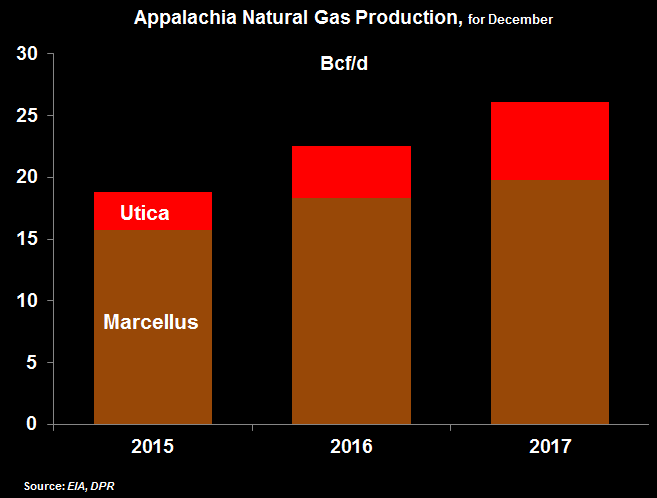Appalachia Drives Growth in U.S. Natural Gas Production
December 11, 2017

In its monthly Drilling Productivity Report, the U.S. Energy Information Administration has recently combined its production data on the “Marcellus” and “Utica” shale plays into “Appalachia.” Given that the Utica is a newer play and just starting to be developed, over 70% of Appalachia’s output comes from the Marcellus centered in Pennsylvania.
At 35% of all U.S. gas production, Appalachia now produces over 26 billion cubic feet per day (Bcf/d), compared to less than 8 Bcf/d just five years ago. In fact, outside the U.S. as a whole and Russia, Appalachia now produces more natural gas than any other nation.
Appalachia has been at the heart of the recent rise in U.S. gas production to historic highs of over 77 Bcf/d, up from the persistent 70-71 Bcf/d range we saw for the first half of the year. This surge has come from the addition of new pipelines coming online, namely the 3.25 Bcf/d Rover pipeline, currently in partial service and expected to be fully in service by the end of Q1 2018.
Looking forward, an additional 16 Bcf/d of new takeaway capacity expected to come online by the end of 2018 will encourage even more gas production in Appalachia. The region will account for over half of all new U.S. gas supply in the decades ahead, with total domestic production expected to increase 1-2% per year.

The sky is really the limit for gas production in the Appalachia region. The Potential Gas Committee reports that it is the richest gas area in the country, with over 1,000 Tcf of technically recoverable volumes. The ongoing evolution of technologies and practices will help companies produce even more.
For example, thanks to efficiency improvements in horizontal drilling and completion techniques, including improved well targeting, faster drilling, and longer laterals, new well gas production per rig in Appalachia is now 14,400 Mcf/d, versus 6,000 Mcf/d this time in 2014. And as prices rise from mounting domestic demand and exports, more natural gas becomes available to produce.
Trane and the Circle Logo are trademarks of Trane in the United States and other countries.
